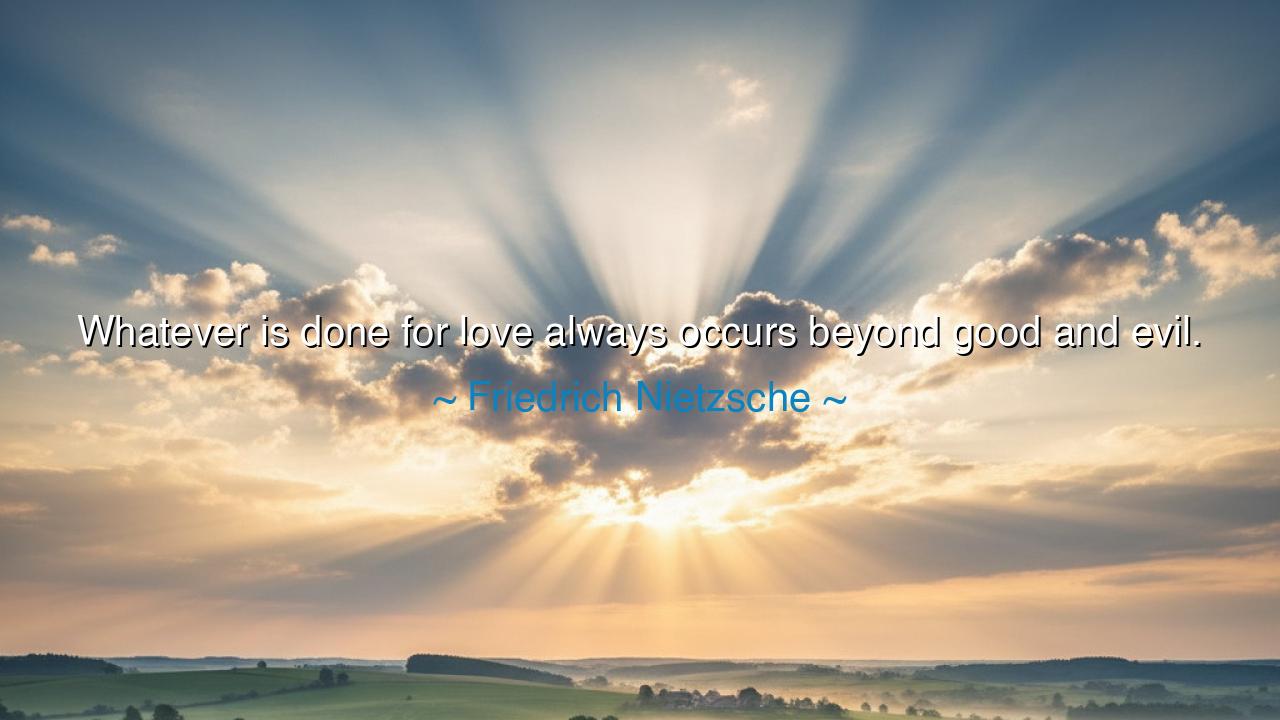
Whatever is done for love always occurs beyond good and evil.






“Whatever is done for love always occurs beyond good and evil.” Thus wrote Friedrich Nietzsche, the philosopher of fire and freedom, whose words cut through the veil of comfort and tradition. To understand this saying is to look into the heart of existence itself — for Nietzsche speaks here of the power of love, not as sentiment or softness, but as a force that transcends the narrow boundaries of morality. He saw that love, when pure and absolute, cannot be confined to the cages of “right” and “wrong,” for it springs from a place deeper than law — from the wellspring of life itself.
Nietzsche, born in a time when faith and reason were at war, sought to awaken mankind from its slumber of obedience. He challenged the notion that goodness could be measured by rules, or that virtue could be dictated by fear of punishment. When he wrote that love moves “beyond good and evil,” he was not praising wickedness — he was revealing that true love, whether for a person, a dream, or an ideal, arises from a realm untouched by human judgment. It acts not to please, not to obey, but simply because it must. In love, one follows a law written by the heart alone.
To love in this way is to act with divine madness — to risk all for the sake of something greater. The mother who leaps into fire to save her child does not weigh the morality of her act; she simply moves. The artist who spends his life in solitude, painting visions that no one understands, is not guided by society’s approval; he creates because love drives him. In that sacred moment, all notions of good and evil dissolve. There is only love — pure, raw, beyond the reach of reason or rule.
Consider the story of Antigone, the daughter of Oedipus, from the ancient Greek tragedy. When her brother was slain and forbidden burial by decree, she defied the king’s law to give him rest. Her act was condemned as treason, yet born of devotion. “I was born to love, not to hate,” she said before her death. In that moment, she lived beyond good and evil. Her act was neither moral nor immoral — it was inevitable. She obeyed not the king of men, but the king within — love itself, that oldest and highest command.
Nietzsche saw that the greatest deeds of humanity — its art, its sacrifice, its creation — were born not of obedience to moral systems, but of passion. The saints who gave their lives for faith, the rebels who tore down tyranny, the poets who sang of freedom — all moved from this same source. Love, he taught, is not gentle; it is dangerous, for it breaks boundaries. It asks us to live truthfully, not respectably. To love deeply is to step beyond comfort, beyond safety, beyond approval — to act in the full radiance of one’s own soul.
And yet, this “beyond” is not chaos. It is authenticity. It is life lived without mask. When one acts from true love — not desire, not vanity, but the sacred love that springs from the spirit — one’s actions align with something greater than morality: they align with truth. Love is the flame that reveals who we truly are. To act from that flame is to be whole.
So, O seekers of wisdom, learn this lesson: love is the highest law. When you act for love — for the good of another, for the beauty of creation, for the calling of your own spirit — do not ask whether it is good or evil. Ask only whether it is true. Let your deeds flow not from fear of sin or hunger for praise, but from the unshakable knowing that love itself is sacred.
Therefore, live beyond good and evil, not in cruelty or pride, but in love’s fierce clarity. Love as the artist loves his vision, as the warrior loves his cause, as the mother loves her child — completely, without hesitation, without measure. For in that state, you will touch the eternal, and know what Nietzsche meant: that whatever is done for love — for that holy, untamed fire within us — is already blessed, already free, already beyond all judgment.






AAdministratorAdministrator
Welcome, honored guests. Please leave a comment, we will respond soon